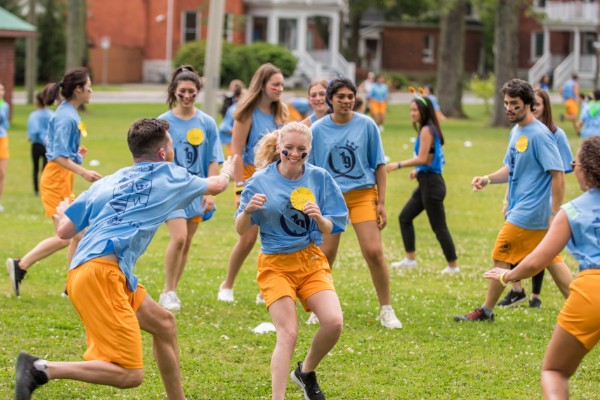Health Sciences creates a brand-new orientation
September 6, 2019
Share

Queen’s is known for its colourful and proud orientation week. Each faculty or program has its own set of colours, chants, and traditions that welcome new students to the university every fall. But one group of students this year is experiencing a brand-new orientation: the incoming Bachelor of Health Sciences (BHSc) students.
The BHSc launched as an online program in 2016, and this fall has started offering a full-time on-campus program as well. The program received over 4,000 applications for its first cohort and has admitted approximately 125 students. Housed in the Faculty of Health Sciences (FHS), the BHSc is a course of study that prepares undergraduate students to pursue a career in health professions, such as medicine, physical therapy, and pharmacy.
As it prepared for this new group of students, FHS needed to create a new orientation to usher them into life at Queen’s.
This situation, however, presented an obstacle. Normally, faculty orientations at Queen’s are led by upper-year students in those programs. Each orientation has an orientation chair, a student who oversees the organization of all activities. But, as a new program, the on-campus BHSc did not have any upper-year students to choose from to be their orientation chair.
To fill this role, the program put out a call to upper year students interested in leading this initiative. Elle Mackenzie, a fourth-year Life Sciences student who had served as an executive for the NEWTS orientation in 2018, was selected and has provided exemplary leadership. While her prior experience had taught Mackenzie about the work that goes into organizing a series of events, the BHSc posed a new challenge: figuring out how to build an orientation from scratch.
Early on, Mackenzie ran into questions that no one at Queen’s had needed to ask for over a decade. How do you set up a bank account for an orientation group? How do you order tams with a new colour scheme? What name do you choose for orientation leaders?
As Mackenzie started to deal with these issues, she found that she had a large support network to rely on. The members of the Orientation Roundtable, the group that coordinates orientation activities across the university, were especially helpful. She also had the help of administrators in the BHSc program as well as the rest of the team of student organizers, which includes the Health Sciences Executive Committee and the orientation leaders.
Working together, the Health Sciences Orientation team has developed a program that introduces new health sciences students to academics, social life, and community outreach at Queen’s. The new orientation also mixes some traditional Queen’s events, like coverall painting, with innovative activities. Let’s Get Scrambled, for example, mixed the students into different teams to take part in a game of capture the flag where the flags are eggs.
To introduce students to the innovative format of classes in the BHSc program, the orientation featured a mock lecture. The on-campus Bachelor of Health Sciences program is taught in an innovative flipped classroom format, in which students are asked to actively engage with concepts in class. The mock lecture, then, was an opportunity for students to get used to the kinds of activities they will be doing in their courses.
Getting involved in the Queen’s spirit of community outreach, the new health sciences students also ran a charity fashion show for Supporting Diabetes Canada. The students brought clothes from home to donate for a fashion show, in which they mixed and matched all the garments to create entertaining outfits, which they then modeled for the group. Representatives from Supporting Diabetes Canada attended the fashion show, taught the students about their organization, and then accepted the donated garments after the event.
Despite all the work that they have put into this year’s program, the organizers have also been keeping in mind that the Health Sciences Orientation will need room to evolve as students from the BHSc program gradually take it over in the coming years.
“We wanted to give health sciences students a solid foundation to build on, but we also wanted to make them feel a sense of ownership over their orientation,” says Mackenzie. “I think we’re all looking forward to seeing how these students put their own stamp on things in the future.”